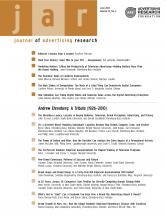Click on the PDF link for the complete article.
ABSTRACT
In preference-matching contexts—specifically, where people enter hoping to find some particular product or service they already know themselves to prefer—more choices should increase the likelihood that they will be successful in their search. Increasing the number of choices, however, actually increases the cognitive workload of consumers, and they may decide consciously or unconsciously simply to apply heuristics—such as clicking the delete button on complex e-mails. This study tested these two alternative theories in a large-field experiment focusing on advertising an experience brand (France as a vacation destination) to Americans under multiple treatment conditions. The findings supported the theory that fewer choices increase behavioral responses, but this effect reversed when an e-mail included a sweepstakes offer. Consequently, the authors found that “it depends on what is offered in conjunction with the direct-sales offers” may be the more accurate perspective than the “less-is-more” proposition.
- © Copyright 2012 The ARF. All rights reserved.
ARF MEMBERS
If you are a member of the Advertising Research Foundation, you can access the content by logging in here
Log In
Pay Per Article - You may access this article (from the computer you are currently using) for 30 days for US$20.00
Regain Access - You can regain access to a recent Pay per Article purchase if your access period has not yet expired.





